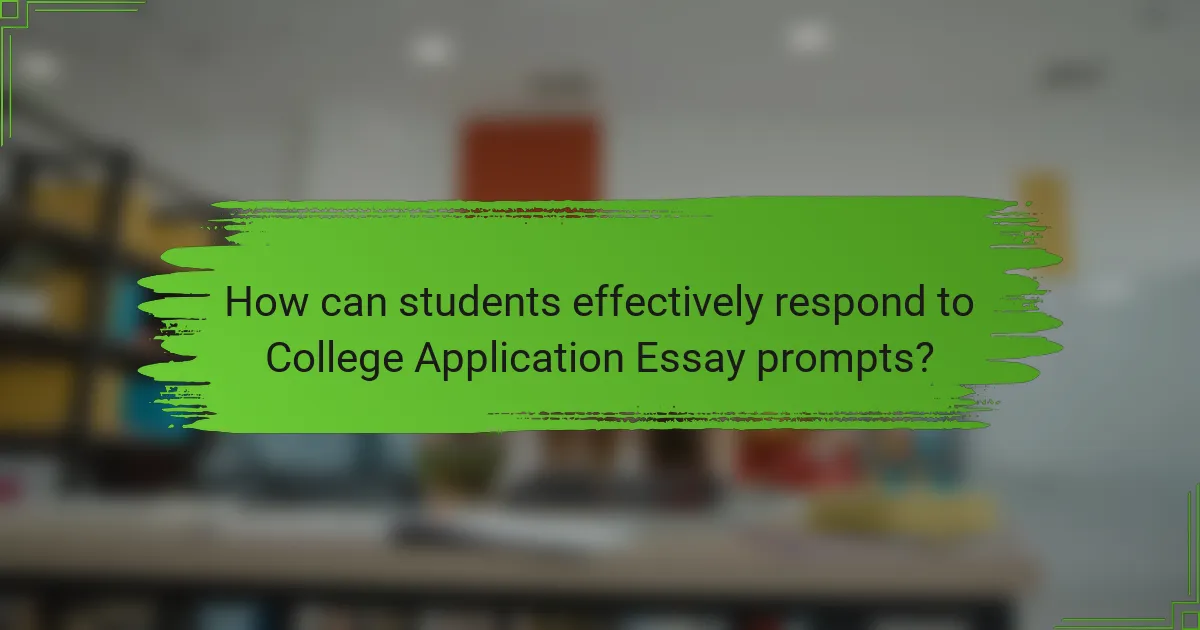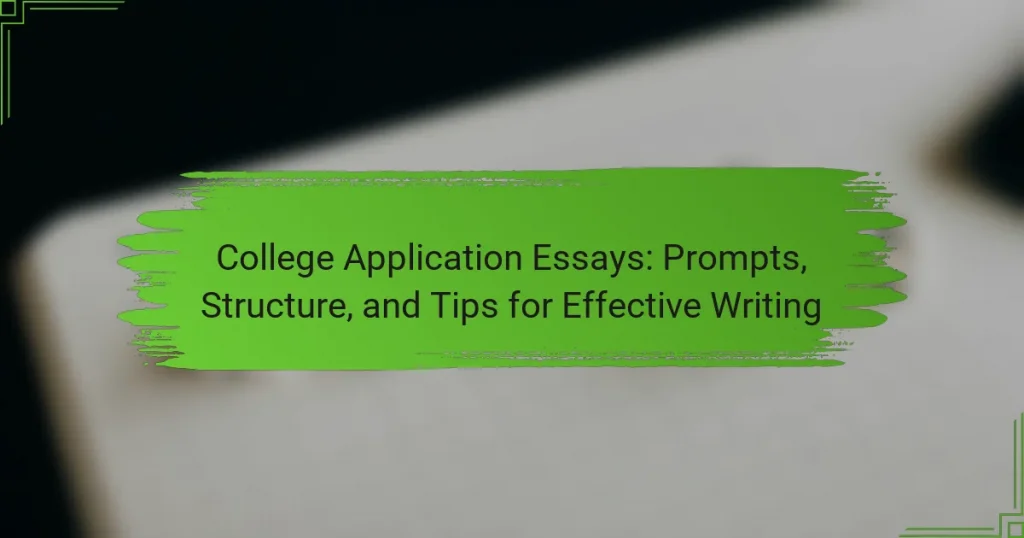
What are College Application Essays?
College application essays are written statements submitted by prospective students as part of their college admissions process. These essays allow applicants to express their personality, experiences, and motivations. They typically respond to specific prompts provided by the college. The essays are an opportunity for students to showcase their writing skills and unique perspectives. Admissions committees use these essays to assess an applicant’s suitability for their institution. A well-crafted essay can significantly impact an applicant’s chances of acceptance. According to a survey by the National Association for College Admission Counseling, 25% of college admissions officers consider essays as a very important factor in their decision-making process.
Why are College Application Essays important?
College application essays are important because they provide insight into an applicant’s personality and experiences. These essays allow students to showcase their unique qualities beyond grades and test scores. Admissions committees use essays to evaluate writing skills and critical thinking abilities. A well-crafted essay can differentiate an applicant in a competitive field. According to the National Association for College Admission Counseling, 86% of colleges consider essays in their admissions decisions. This statistic underscores the significance of essays in the selection process. Ultimately, these essays help colleges understand the applicant’s fit within their community.
What role do they play in the admissions process?
College application essays play a crucial role in the admissions process. They provide insight into an applicant’s personality and character. Essays allow students to showcase their writing skills and creativity. Admissions committees use essays to assess fit within the institution’s culture. A well-crafted essay can differentiate candidates with similar academic records. Essays often reflect an applicant’s experiences and motivations. They can highlight unique perspectives and personal growth. Overall, essays are a vital component of a holistic review process in college admissions.
How can they impact a student’s chances of acceptance?
College application essays can significantly impact a student’s chances of acceptance. A well-crafted essay showcases a student’s personality, experiences, and writing skills. Admissions officers often look for unique perspectives that differentiate applicants. Essays can reveal qualities such as resilience, creativity, and critical thinking. Studies show that compelling narratives can enhance an applicant’s appeal. For instance, a survey by the National Association for College Admission Counseling found that 24% of colleges consider essays as a very important factor. Strong essays can also help mitigate lower grades or test scores. Ultimately, a standout essay can be a deciding factor in the admissions process.
What are the common types of College Application Essay prompts?
Common types of college application essay prompts include personal statements, reflective essays, and creative prompts. Personal statements often ask applicants to discuss their background, experiences, and motivations. Reflective essays typically require students to analyze a significant event or challenge in their lives. Creative prompts encourage applicants to think outside the box, often asking for unique perspectives or imaginative responses. Additionally, some prompts may focus on specific themes, such as leadership, diversity, or community service. These categories help colleges understand applicants’ values and character.
What are the general categories of prompts?
General categories of prompts include personal statements, reflective essays, and creative responses. Personal statements focus on the applicant’s experiences and aspirations. Reflective essays ask students to discuss significant life events or challenges. Creative responses encourage imaginative thinking and expression. Each category serves to reveal different aspects of the applicant’s personality and qualifications. These categories are commonly used in college application processes to assess candidates holistically.
How do personal statements differ from supplemental essays?
Personal statements and supplemental essays serve different purposes in college applications. A personal statement typically provides a broad overview of the applicant’s background, experiences, and motivations. It often focuses on personal growth and overarching themes in the applicant’s life. In contrast, supplemental essays are specific prompts provided by individual colleges. They require tailored responses that address particular aspects of the institution or the applicant’s fit for that college. Personal statements are generally a single essay, while supplemental essays can vary in number and length. Each college may have unique requirements for supplemental essays, emphasizing the need for applicants to research and respond accordingly.
What is the typical structure of a College Application Essay?
A typical structure of a college application essay includes an introduction, body paragraphs, and a conclusion. The introduction presents the main idea or theme of the essay. It often includes a hook to engage the reader. Body paragraphs provide supporting details and examples related to the main idea. Each body paragraph typically focuses on a specific aspect or experience. The conclusion summarizes the key points and reflects on their significance. This structure helps to create a coherent narrative. It allows the writer to effectively communicate their personal story and insights.
What are the key components of a successful essay?
A successful essay includes a clear thesis statement, structured organization, and relevant evidence. The thesis statement presents the main argument or focus of the essay. Structured organization involves an introduction, body paragraphs, and a conclusion. Each body paragraph should support the thesis with specific evidence or examples. Relevant evidence strengthens the argument and enhances credibility. Effective transitions between paragraphs improve flow and coherence. Finally, a strong conclusion summarizes key points and reinforces the thesis. These components work together to create a compelling and persuasive essay.
How can one create a compelling introduction?
A compelling introduction captures the reader’s attention and sets the tone for the essay. Start with a hook, such as a surprising fact or a personal anecdote. This engages the reader immediately. Clearly state your main idea or thesis to provide direction. Ensure that the introduction relates to the overall theme of your essay. According to a study by the National Association for College Admission Counseling, essays that begin with a strong introduction are more likely to resonate with admissions officers. This demonstrates the importance of crafting an effective opening.

How can students effectively respond to College Application Essay prompts?
Students can effectively respond to College Application Essay prompts by carefully analyzing the prompt first. Understanding the specific question being asked is crucial. They should brainstorm personal experiences that relate to the prompt. This helps in generating relevant content.
Next, students should create an outline to organize their thoughts. An outline ensures a logical flow of ideas. Writing a draft allows students to express their thoughts freely. After drafting, they should revise for clarity and coherence.
Editing for grammar and spelling is essential. A polished essay reflects attention to detail. Seeking feedback from teachers or peers can provide valuable insights. Incorporating constructive criticism enhances the final product.
By following these steps, students can produce compelling essays that stand out to admissions committees.
What strategies can be used to brainstorm essay topics?
To brainstorm essay topics, one effective strategy is to use free writing. This involves writing continuously for a set period without worrying about grammar or structure. It allows ideas to flow freely and can generate unexpected topics. Another strategy is to create a mind map. This visual tool helps organize thoughts and explore connections between ideas. Listing personal experiences or interests can also yield potential topics. Reflecting on challenges faced or lessons learned can provide rich material. Additionally, discussing ideas with peers can lead to new insights. Researching current events or trends can inspire relevant topics as well. Using these strategies can enhance creativity and lead to compelling essay topics.
How can students identify their unique stories?
Students can identify their unique stories by reflecting on personal experiences and values. They should consider significant life events that shaped their perspectives. This includes challenges faced, achievements, and pivotal moments. Journaling can help clarify thoughts and emotions related to these experiences. Additionally, discussing their narratives with trusted individuals can provide new insights. Analyzing what makes them different from peers is also crucial. Ultimately, students should focus on authenticity and how their stories connect to their aspirations. This approach ensures their narratives resonate in college application essays.
What techniques can help in narrowing down ideas?
Brainstorming is a technique that can help in narrowing down ideas. It involves generating a list of potential topics without judgment. This process allows for the exploration of various angles. After brainstorming, prioritizing ideas based on relevance is essential. Evaluating each idea against the essay prompt can further refine choices. Mind mapping can also visualize connections between ideas. This technique helps in identifying the strongest concepts. Finally, seeking feedback from peers can provide new perspectives. This collaborative approach often highlights the most compelling topics.
What are the best practices for writing College Application Essays?
The best practices for writing college application essays include starting early and brainstorming ideas. Students should reflect on their experiences and values to find unique angles. Writing in a clear and engaging style is essential. Using specific anecdotes can illustrate points effectively. Revising multiple drafts helps refine the essay’s content and clarity. Seeking feedback from teachers or peers can provide valuable perspectives. Adhering to word limits is crucial for meeting application requirements. Finally, proofreading for grammar and spelling errors ensures professionalism in the submission.
How important is the writing style and tone?
Writing style and tone are crucial in college application essays. They significantly influence how the applicant’s personality and intentions are perceived. A consistent style and appropriate tone can engage the reader effectively. It helps convey the applicant’s voice authentically. Research indicates that admissions officers often look for individuality in writing. According to a survey by the National Association for College Admission Counseling, 86% of college admissions officers consider the writing style as a key factor. Therefore, a well-crafted style and tone can enhance an applicant’s chances of standing out.
What role does revision play in the writing process?
Revision is a critical component of the writing process. It allows writers to refine their ideas and improve clarity. During revision, writers assess the structure and flow of their work. They check for coherence and logical progression of thoughts. This stage also involves correcting grammatical errors and typos. Research shows that multiple revisions can enhance the quality of writing significantly. A study by the National Council of Teachers of English found that students who revise their essays score higher on assessments. Effective revision leads to more polished and compelling college application essays.

What tips can enhance the effectiveness of College Application Essays?
To enhance the effectiveness of college application essays, focus on authenticity and clarity. Authenticity allows the admissions committee to understand the applicant’s true self. Clarity ensures that the essay’s message is easily understood. Use specific examples to illustrate points. This approach makes the essay more relatable and engaging.
Additionally, adhere to the prompt closely. Each prompt has specific requirements that should be addressed directly. Proofread multiple times to eliminate errors. A well-edited essay reflects attention to detail. Seek feedback from teachers or peers for different perspectives. Their insights can highlight areas for improvement. Finally, maintain a consistent tone and voice throughout the essay. This consistency strengthens the overall narrative.
How can students ensure their essays stand out?
Students can ensure their essays stand out by showcasing their unique perspectives and experiences. They should begin with a compelling hook that captures attention immediately. Personal anecdotes can provide authenticity and make their writing relatable. Clear and concise language enhances readability and engages the reader. Students should also demonstrate self-reflection and personal growth throughout their essays. Highlighting specific achievements or challenges adds depth to their narrative. Additionally, thorough proofreading eliminates errors that could detract from their message. Research indicates that essays with personal stories resonate more with admissions officers, making them more memorable.
What common mistakes should be avoided in college essays?
Common mistakes to avoid in college essays include lack of focus, poor structure, and grammatical errors. A clear thesis statement is essential for guiding the essay. Each paragraph should support this thesis with relevant evidence. Incoherent organization can confuse readers. Transition sentences are necessary to connect ideas smoothly. Overusing clichés can make the essay unoriginal. Personal anecdotes should be authentic and relevant to the topic. Lastly, failing to proofread can lead to overlooked mistakes that diminish the essay’s quality.
How can feedback from others improve the essay quality?
Feedback from others can significantly enhance essay quality. It provides different perspectives that the writer may not have considered. Peer reviews often highlight unclear arguments or weak points in logic. Constructive criticism can lead to improved clarity and coherence in writing. Suggestions for better word choice can enhance the essay’s overall impact. Feedback can also identify grammatical errors that the writer may overlook. Studies show that collaborative writing improves overall writing skills, as noted in research by Graham and Perin (2007), which emphasizes the benefits of peer feedback in educational settings. Thus, incorporating feedback helps produce a more polished and effective essay.
What resources are available for College Application Essay writing?
Resources available for College Application Essay writing include online guides, writing workshops, and professional editing services. Websites like College Board and Common App provide comprehensive information on essay prompts. Writing centers at many colleges offer personalized feedback. Books specifically on college essays, such as “College Essay Essentials” by Ethan Sawyer, offer structured advice. Numerous online platforms, like Khan Academy, provide free resources and tips. Additionally, peer review groups can offer constructive criticism. These resources collectively enhance the quality and effectiveness of college application essays.
What online tools can assist in the writing process?
Online tools that can assist in the writing process include grammar checkers, plagiarism detectors, and collaborative writing platforms. Grammar checkers like Grammarly help identify grammatical errors and suggest improvements. Plagiarism detectors such as Turnitin ensure originality by comparing text against a vast database. Collaborative writing platforms like Google Docs facilitate real-time editing and feedback from peers. These tools enhance writing quality and streamline the editing process. Their effectiveness is supported by user testimonials and widespread adoption in educational settings.
How can students find mentors or advisors for guidance?
Students can find mentors or advisors for guidance by leveraging various resources. They can start by reaching out to faculty members at their educational institutions. Professors often have experience and connections in their fields. Networking events and workshops provide opportunities to meet potential mentors. Online platforms like LinkedIn can also facilitate connections with professionals. Additionally, students can seek guidance from alumni networks. Many colleges have formal mentorship programs that pair students with experienced individuals. Utilizing social media groups related to their interests can further expand their search. Engaging in community service or internships can lead to valuable mentorship opportunities.
What final advice can help students succeed in their College Application Essays?
Students should focus on authenticity in their college application essays. Authenticity allows students to present their true selves. Admissions officers value genuine voices and unique perspectives. Students should also ensure clarity and coherence in their writing. Clear essays effectively communicate ideas and experiences. Editing and revising are crucial steps in the writing process. Multiple drafts help refine content and improve overall quality. Seeking feedback from teachers or peers can provide valuable insights. Constructive criticism can enhance the essay’s effectiveness. Finally, students should adhere to word limits and guidelines provided by colleges. Following these parameters shows respect for the application process.
College application essays are written statements that prospective students submit as part of the admissions process, allowing them to express their personality, experiences, and motivations. This article covers the importance of these essays, their role in the admissions process, and how they can impact a student’s chances of acceptance. It discusses common types of essay prompts, the structure of a successful essay, and best practices for writing, including tips for brainstorming topics and ensuring clarity. Additionally, it highlights the significance of feedback and resources available to assist students in crafting compelling essays.




